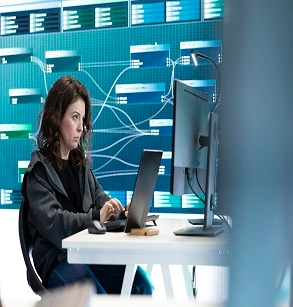Are you interested in Forensic Accounting? Then this is the perfect course for you. Learn how to manage Forensic professionally!
450 Hours Duration
Completion Certificate
No Entry Requirements
Endorsed Courses
Get Your Course Now
Only 1 Day Left at this price
Discount 80% £660.00


Course Overview
A Forensic Accountant Course
This advanced forensic accountant course qualifies candidates to work in several areas including but not limited to bankruptcies, family law, detecting and preventing fraud, forensic analysis, interpreting financial statements, etc.
Units one through twelve contain major skills that qualify a forensic accountant for high-level employment. In unit one, candidates are made to understand the basic features and terminologies used in forensic accounting. Then, they are introduced to financial criminality and notable financial crime trends that will improve prediction skills. The common personality traits and the fraud detection methods are then stated before moving on to investigation and its procedures, steps taken to gather pertinent evidence and the importance of non-financial evidence in an investigation. Towards the end, the course discusses the process of identifying and investigating witnesses, the relevance and procedures of fraud risk assessment, effective fraud prevention techniques, the definition of cyber-crime and the best ways to prevent it. The course ending with unit twelve, it explains the roles of a forensic accountant in a forensic investigation team.
There is no fixed schedule, hence, this Forensic accounting Advanced Diploma is taken on your terms. Candidates are encouraged to take this course regardless of the presence or absence of any previous knowledge, they will be provided with personal tutors to ensure proper assimilation. After completing this course, candidates will be presented with an endorsed certificate that will be of great help in the search for a position in the industry.
Who Should Take This Course
- Anyone looking to establish a freelance business
- Graduates looking to improve their CV
- Business owners
- Financial executives with little to no knowledge on forensics
- Accountants pursuing promotion
Course Syllabus
The Diploma in Forensic Accounting contains following Modules:
Module 1: Foundations of Forensic & Investigative Accounting in the AI Era
This module introduces the fundamentals of forensic and investigative accounting, exploring its role in modern finance and the impact of AI on fraud detection practices.
Module 2: Fraud Schemes, Economic Crime & Behavioural Red Flags
Learners study common fraud schemes and economic crimes while also learning to identify behavioural red flags that signal fraudulent activity.
Module 3: Data Analytics & AI Techniques for Fraud Detection
This module focuses on the use of data analytics and AI tools to detect unusual financial patterns, making fraud investigations faster and more effective.
Module 4: Digital Evidence Collection & Preservation
Students learn methods to collect, secure, and preserve digital evidence, ensuring accuracy and admissibility in legal proceedings.
Module 5: Investigative Procedures & AI Enhanced Evidence Analysis
This module covers advanced investigative techniques while highlighting how AI enhances evidence review and analysis for fraud cases.
Module 6: Cybercrime, Cyber Security & Risk Mitigation
Learners explore cybercrime threats, cybersecurity principles, and strategies to protect organisations against financial and digital risks.
Career Path
Completing A Forensic Accountant Course certifies that candidates are fully prepared to work as forensic accountants in any organization and on any investigation team. You may decide to work in whichever area of your choice… loss prevention, financial tax, financial forensics or others with a starting salary between £30,000 and £60,000.
Endorsement
At the end of this course successful learners will receive a Certificate of Achievement from the Quality Licence Scheme and a Learner Unit Summary (which lists the components the learner has completed as part of the course).
This course and/or training programme has been endorsed by the Quality Licence Scheme for its high-quality, non-regulated provision and training programmes. This course and/or training programme is not regulated by Ofqual and is not an accredited qualification. Your training provider will be able to advise you on any further recognition, for example progression routes into further and/or higher education. For further information please visit the Learner FAQs on the Quality Licence Scheme website.
FAQs
Q1: How difficult is forensics?
A: Forensics can be challenging due to the analytical skills, attention to detail, and legal understanding required. However, with structured learning and practice, it becomes manageable and rewarding.
Q2: Is forensics a good class?
A: Yes, forensics is an excellent class for those interested in crime investigation, financial integrity, and legal justice. It combines critical thinking, real-world application, and professional development.
Q3: Which subject is best for forensic?
A: Subjects like accounting, law, criminology, computer science, and statistics are highly beneficial for a career in forensic investigations and analysis.
Q4: What qualifications do you need to become a forensic accountant?
A: A background in accounting or finance is essential. Specialized certifications such as this Advanced Diploma in Forensic Accounting enhance credibility and expertise in fraud detection and investigation.
Q5: Which forensic career is best?
A: Forensic accounting, digital forensics, forensic psychology, and crime scene investigation are among the top forensic careers. The best choice depends on your interests and skills.
Q6: What makes this Level 5 Diploma different from the Level 3 Certificate?
A: The Level 5 Diploma offers deeper insight into complex investigative procedures, fraud risk assessments, cyber-crime prevention, and team-based investigations, building on the foundational knowledge from Level 3.
Q7: Does this course include real-world scenarios or case studies?
A: Yes, the course explores real-life fraud trends, investigative practices, and behavioural traits to enhance practical understanding and readiness for real-world forensic tasks.
Q8: Will I learn how to investigate cyber-crimes in this course?
A: Absolutely. Unit 11 specifically focuses on cyber-crime, including its definition, common forms, and practical strategies for cyber-security and prevention.
Q9: Is this course suitable for professionals already working in finance?
A: Yes, it’s ideal for finance professionals seeking to specialize in fraud prevention, forensic investigation, or compliance roles.
Q10: What kind of certificate will I receive after completing the course?
A: You will be awarded a CPD-accredited Advanced Diploma certificate issued by OHSC, as well as a Certificate of Completion from CPD Courses, validating your advanced forensic accounting skills.


Your Certificate, Delivered Instantly & Professionally
Finish your course and instantly download your PDF certificate to share or showcase. Prefer a hard copy? We’ll send you a beautifully printed version, ready to frame and display with pride!
Recognised CPD Certification
Earn a fully accredited CPD certificate that’s respected across industries.
Instant Download & Print
Download your certificate immediately after completing your course – perfect for your records or CV.
Printed Copy Included
You’ll also receive a professionally printed certificate delivered straight to your door – ideal for framing and display.

Verifiable Unique ID
Each certificate includes a unique ID number, easily verifiable by employers.
High-Quality Print
Enjoy a professionally printed certificate that looks impressive and feels premium.
Completion dates included
Your certificate clearly displays the completion date, making renewal planning simple.
What our Students say
Celebrating our Clients and Partners





























